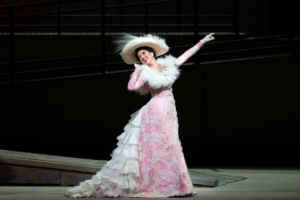Review Roundup: What Did Critics Think of MANON at Metropolitan Opera?

Manon just opened at the renown Met Opera and we have a reviews for you!
Exhilarating soprano Lisette Oropesa stars as the irresistible title character, the tragic beauty who yearns for the finer things in life, in Laurent Pelly's revealing production. Tenor Michael Fabiano is the besotted Chevalier des Grieux, whose desperate love for Manon proves their undoing. Maurizio Benini conducts Massenet's sensual score.
Check out the reviews below!
Joshua Barone, The New York Times: Ms. Oropesa slips into the title role as if it were custom couture. In her first aria, "Je suis encore tout étourdie," sung with enunciation so clear it could be transcribed, she has an innocent lightness that gives way to intoxicating joy as it becomes apparent that Manon is already too grand for her humble packaging at the start: slight frame; childish hat and ponytail; plain outfit in muted blues.
David Salazar, OperaWire: But if anyone deserves special mention, it is baritone Artur Rucinski as Lescaut. In other performances of the opera, it can be easy to overlook Lescaut in the context of the two main lovers, but the Polish singer made his presence not only known, but truly felt. Not only did he create a complex portrayal of Lescaut as well-meaning but irresponsible figure to Manon, but he delivered an elegant vocal performance that hopefully will lead to more prominent roles at the Met ("Eugene Onegin" anyone?). His upper range was particularly resplendent.
Eric C. Simpson, New York Classical Review: Sleepy acting and canned gestures onstage certainly accounted for much of Tuesday's lethargy, but Maurizio Benini's conducting was at least as much to blame. A house regular for Bel Canto revivals, he showed little feel for the more shapely contours of Massenet's style. Ensemble scenes felt ragged and the pacing dragged throughout the night; more to the point, his rendition of the score was colorless, offering the singers little more than cues.
Richard Sasanow, BroadwayWorld: The place where the production falls short--at least in this iteration--is the big scene in the church of Saint-Sulpice, with Fabiano's des Grieux now a priest rather than a nobleman. Back in Act I, des Grieux falls madly, passionately in love at first sight with the teenage Manon; the French call it "un coup de foudre," a thunder bolt. His ardent singing is clearly enough to sweep the young girl off her feet and into his garret. The trouble is that he holds onto this high intensity and urgency with very little variation (even though there are places it's clear he knows how to do this). That is, until we enter Saint Sulpice, where he has turned to the priesthood after Manon looked for better opportunitities, once pere des Grieux, le Comte (the fine bass Kwangchul Youn), has his son kidnapped in order to put him on the right path for a young nobleman.
Photo Credit: Marty Sohl
Reader Reviews

Videos
